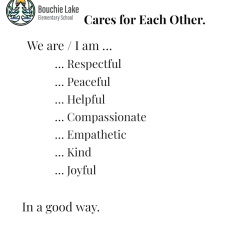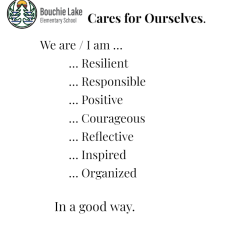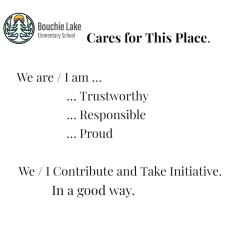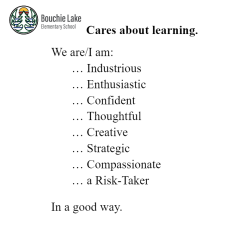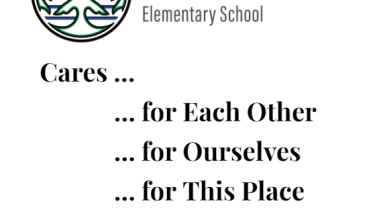
Code of Conduct
Supportive Spaces
Our Belief:
We believe that students, parent/caregivers and staff members of Bouchie Lake Elementary School care about each other, care about themselves, care about learning, and care about this place. We engage 'in a good way' while becoming the best version of ourselves, respecting the rights of ourselves and others.
We believe that, as adults, it is important to support and teach students ways to positively interact with others just as we support and teach our students academic skills.
Our Goals:
To improve student’s feeling of generosity toward self and others; to improve school success, sense of belonging and connectedness, and promote a safe and respectful school climate for all students and staff.
To Create a respectful and non-threatening environment for all students, with opportunities to demonstrate leadership, cooperation, collaboration and appreciation for the environment.
Code of Conduct:
Quesnel School District Policy #305 gives Principals the authority and responsibility for establishing the school Code of Conduct and Behaviour.
SCHOOL-WIDE DISCIPLINE
MINOR
The following incidents are generally dealt with by your child's teacher or supervisor. Your child's teacher will contact you should the situation become chronic.
|
|
MAJOR
The following incidents are dealt with by the Principal or designate.
|
|
Possible actions could include:
Time Out
If the situation is appropriate, a student may be assigned a time-out, in or outside of class. A student may be excluded from the school routine with the knowledge of the parent.
Lunch Hour/Recess Restriction
A student's free time may be restricted if he or she is assigned an in-school suspension, where a student attends classes as usual, but is assigned a time-out during free time periods. A student may also be restricted as a consequence of being unable to behave appropriately without direct supervision. Time-outs of this type are usually served in the office or the time-out room.
Suspension
A student may be suspended from school for serious incidents as listed below. The Principal may suspend students out of school for definite periods up to ten school days. In extreme cases, the Principal may suspend for an indefinite period, with a resulting referral to the District Code of Conduct Committee. Parents will be notified by telephone or writing if their child is suspended.
Restitution
if a student victimizes another student or property damage occurs, the offending student must provide adequate compensation. This requires effort on the part of the offender and discourages further offences.
Removal
Under section 188 of the School Act of British Columbia, the Principal or designate in charge of the school is authorized to require the removal of any person creating a disturbance or interrupting the proceedings of the school or school function.
Parent Contact
Student's parents will be contacted by telephone if a type of behaviour or situation is becoming common or chronic for this student, such as:
- attendance, tardiness, minor misbehaviours
Or serious incidents such as:
- fighting, smoking, assault, violence, threats of violence, bullying, weapons, alcohol, drugs, vandalism, harassment, disrespect of an adult in the position of authority, etc.
Notifications
Depending on the situation, the Principal or designate may have a responsibility to advise other parties of serious breaches of the Code of Conduct. For example:
- Parents of student offender(s)
- Parents of student victims(s)
- School District Officials-as required by District Policy
- Police and/or other agencies-as required by law
- All student parents - when deemed to be important to reassure members of the school community that the school staff are aware of a serious situation or incident and are taking appropriate action to address it.
